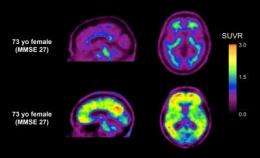Tracing the impact of amyloid beta in mild cognitive impairment

The amount of amyloid β (Aβ) in the brains of people with mild cognitive impairment (MCI) is contributing to early memory loss, and increases with severity of symptoms, finds a study in BioMed Central's open access journal Alzheimer's Research & Therapy. The non-invasive study which used 18F-florbetaben to find Aβ plaques in brain scans to also show that in MCI the affect of Aβ on memory loss is independent of other aspects of mental decline.
Positron emission tomography (PET) has previously relied on carbon-11 labeling of Aβ, however this study uses 18F-florbetaben which can be used for longer and allow more patients to be scanned at lower cost. A higher than normal amount of Aβ was found in half of the PET scans of people with MCI. Interestingly there was a strong association between Aβ and memory loss, but not with other features of neurodegeneration, such as hippocampal atrophy or the white matter hyperintensities frequently seen on MRI later in the development of Alzheimer's disease.
Prof Christopher Rowe, from Austin Health, Australia and the University of Melbourne, who led the study explained why it is important, "MCI is thought to affect between one in five and one in ten of all adults over the age of 65, and, although some of these will go on to develop dementia within a few years, the majority can lead a relatively normal life. Detection of Aβ plaques in MCI indicates early Alzheimer's disease, while a negative scan eliminates this possibility. Consequently a negative scan is very reassuring while a positive scan can lead to earlier and more appropriate medical and social management."
More information: 18F-florbetaben Abeta imaging in mild cognitive impairment Kevin Ong, Victor L Villemagne, Alex Bahar-Fuchs, Fiona Lamb, Gaël Chételat, Parnesh Raniga, Rachel S Mulligan, Olivier Salvado, Barbara Putz, Katrin Roth, Colin L Masters, Cornelia B Reininger and Christopher C Rowe, Alzheimer's Research & Therapy (in press)
















